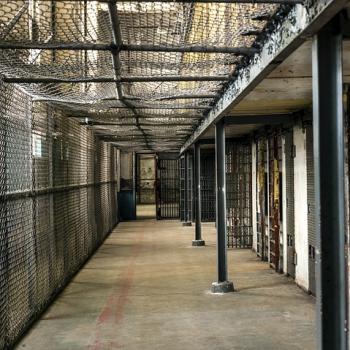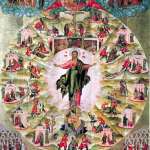There is only young Lot, who is not nearly as good a man as Abraham, but he probably thinks he’s great because his neighbors are so much worse.
I think a lot of people overlook the details and assume that Lot does exactly what Abraham does, but he doesn’t. Lot isn’t doing anything actively to change the city, nor is he leaving; he’s minding his own business, keeping his own nose clean, sitting at the gate. According to the Talmud this is just after one of his daughters was burned to death, and he’s still not moving out. He’s sitting there. He doesn’t run up to greet the strangers, but waits until they approach. Then he stands up to greet them and does the customary bow, because he doesn’t lack manners. He’s a cultured man. Lot invites the strangers to stay the night at his house. Unlike with Abraham, they are reluctant to accept his hospitality, but he talks them into it. And apparently his wife can’t be bothered to make a feast, because the text says that Lot himself throws together some “bread without yeast.” No curds and whey, no meat, just bachelor pancakes for the Lord. Compared to what the other Sodomites did to travelers in the Talmud, this probably seems generous to Lot.
While they’re eating plain bread, the neighbors show up.
“Where are the men who came to you tonight? Bring them out to us so that we can have sex with them.”
Okay, there’s the homosexuality everyone claims is the point of the text. But they’re not kindly inviting the newcomers out for a consensual orgy and a Pride parade. They’re a mob threatening to rape them.
And what does Lot do?
His response can hardly be called ethical. It’s got a certain level of good manners and breeding according to the chauvinistic customs of his day, but it’s not a just response to say the least. He offers to throw the neighbors his two virgin daughters instead. “But don’t do anything to these men, for they have come under the protection of my roof,” says Lot. He doesn’t say “Don’t do anything to these men, because that’s a horrible thing to do;” he doesn’t say “Don’t do anything to these men, because they should be left alone,” he says “for they have come under the protection of my roof.” Lot only seems to care that no disgrace comes down on him and his house. He wants to mind his manners and stand on custom, not to care for people.
The Lord solves this problem with a quick plague of blindness, and the neighbors can’t get in the door. The Lord informs Lot that Sodom just failed the test and is going to be destroyed. Lot tries to save his sons-in-law, but they don’t listen, so the two guests lead Lot and his immediate family out of the city. This is often regarded as the Lord rewarding Lot for being a good man, but I just don’t think the text supports that. Lot is better than a gang of rapists, but he’s not admirable, and the Lord in turn does him a favor better than leaving him to burn to death. But Lot doesn’t get to bring all his stuff, the wealth Abraham gave him when they parted ways. And he doesn’t exactly go along quietly. The angels grab him, his wife and daughters, and physically drag them to safety.
Lot’s wife, my personal favorite character, hates her neighbors so much she wants to look back and watch them burn. She turns into a nice healthy pile of Dead Sea Salt, and the city of Sodom becomes the Dead Sea.
Many people leave off the text there, but that’s not the end of Lot. Lot doesn’t live happily ever after. He finds himself without a home, without resources, married to a pillar of salt, with no companions but the two daughters he just tried to give away to a gang of rapists to save his own reputation. He’s afraid to go and live in the nearby city of Zoar, so he takes his daughters and lives homeless in the mountains. His daughters are quite a bit like their dad– not ethical, but with a certain understanding of custom and cultural taboos. They feel the worst thing that could happen to them was that they should die without a male heir, but they can’t exactly hope for a husband to materialize for them out in the wilderness. So they get their father drunk, and they rape him.
That’s how the story of Sodom and Gomorrah ends: with Lot, who was a better man than his neighbors, getting raped in a cave. Abraham goes on to be the father of Isaac, a legitimate son who will in turn be the father of Israel, and Israel the father of twelve tribes. Lot becomes the father of the incestuously conceived Moab and Ben-Ammi, whose descendants will antagonize the Israelites forever.
At this point, we may well ask ourselves, “Where’s the sex?” Sodom and Gomorrah have gone down in history as names synonymous with the most outlandish sexual excesses. But when I look at the Bible and the tradition of wisdom surrounding it, I don’t see it. I see three mentions of sexual intercourse: one attempted homosexual gang rape where the neighbors can’t even find the door, and two counts of heterosexual rape for strictly utilitarian purposes. The vast majority of the text is about hospitality: Abraham doing it right, Lot doing a little less than the minimum, and the other Sodomites playing the part of Goofus to Abraham’s Gallant and giving a prime example of what not to do to strangers. And the Lord metes out justice in kind.
I’m going to go out on a limb and say that the text is not actually about how much the Lord wants to kill gay people. I never pretended to be a theologian, but I’m pretty sure it’s actually about caring for those the Lord sends you– the vulnerable people you find in your life. It’s about running to show generous hospitality to strangers who need it, always giving 100% to your guests, and having respect for the safety and integrity of your children and your old Dad. Those who do these things are righteous, and those who don’t are not. Those who go out of their way to welcome and help people are righteous, and those who merely stand on ceremony are not.
I see the additional moral, that it’s not enough to be better than your neighbors. You have to be willing to be truly just. Not that one person in an truly unjust society who remembers to throw a dollar in the beggar’s cup and thinks he must be a saint for doing it, but an actual saint. It’s not enough to be a little bit better than the terrible example you see in society. We all have to strive to be good by the Lord’s standards, not by those around us.
And this isn’t just some rebellious woman blogger telling you that’s how you’re supposed to interpret the story of Sodom. Ezekiel says:
“Behold, this was the guilt of your sister Sodom: she and her daughters had pride, excess of food, and prosperous ease, but did not aid the poor and needy. They were haughty and did an abomination before me.”
When you call someone a Sodomite, it seems, you’re not saying very much about whether they’re gay or straight. You’re actually claiming they’re some kind of selfish pig who doesn’t believe in charitable giving and will go to any lengths including rape to humiliate and abuse a stranger, rather than helping them. The very best man that the Lord could find in Sodom didn’t run to Him, gave Him nothing to eat but bread, and only tried to protect Him to make himself look good. The rest of the men in Sodom were worse.
Now, are there any other questions?
(image via Pixabay)

















